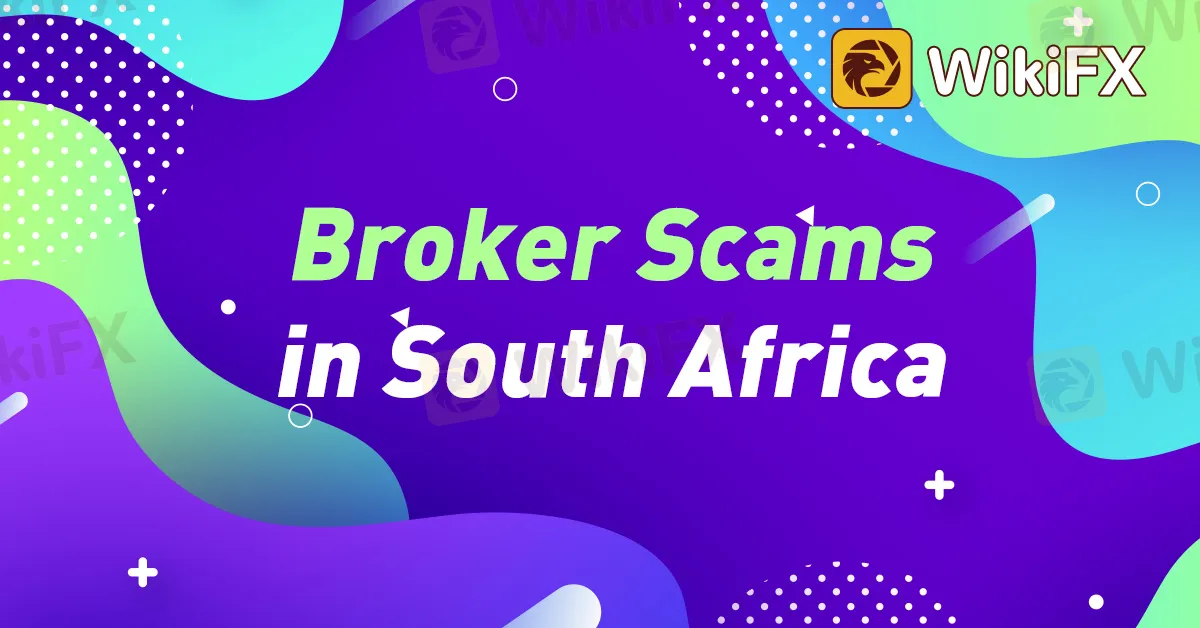简体中文
繁體中文
English
Pусский
日本語
ภาษาไทย
Tiếng Việt
Bahasa Indonesia
Español
हिन्दी
Filippiiniläinen
Français
Deutsch
Português
Türkçe
한국어
العربية
Broker Scams in South Africa
Abstract: In this article, we'll explore how brokers scam traders in South Africa and what you can do to protect yourself.

Trading in the financial markets can be an exciting and lucrative venture, but it can also be a breeding ground for scammers looking to exploit traders. Unfortunately, South Africa is no exception when it comes to broker scams. In this article, we'll explore how brokers scam traders in South Africa and what you can do to protect yourself.
One common tactic used by scammers is to offer unrealistic profits or bonuses to entice traders to sign up. They may also promise low spreads or zero commissions, only to later charge hidden fees or increase spreads to make up for the loss. Additionally, some brokers may manipulate prices or execute trades in their own favor, leading to losses for their clients.
Another tactic is to provide misleading information or withhold important details. For example, some brokers may claim to be regulated by reputable authorities, when in fact they are not. They may also hide information about their ownership or financial status, making it difficult for traders to determine their legitimacy.
To avoid falling victim to these scams, it's important to do your due diligence before choosing a broker. Research the broker's background and read reviews from other traders. Check if they are registered with relevant regulatory bodies, such as the Financial Sector Conduct Authority (FSCA) in South Africa.
One resource that can help you in your research is WikiFX. WikiFX is a leading platform that provides unbiased and comprehensive information on brokers worldwide. They have a team of professionals who conduct rigorous investigations and verifications to ensure the accuracy and reliability of their data.
On WikiFX, you can find detailed profiles of brokers, including their regulatory status, ownership, and trading conditions. You can also read reviews from other traders and compare different brokers based on their features and services. Additionally, WikiFX offers a range of educational resources, such as trading guides and market analysis, to help traders improve their skills and stay informed.
In conclusion, broker scams are a serious issue in South Africa and it's important to take steps to protect yourself. Be wary of unrealistic promises or hidden fees, and do your research before choosing a broker. Consider using resources like WikiFX to help you make informed decisions and avoid falling victim to scams. With the right knowledge and tools, you can navigate the financial markets with confidence and achieve your trading goals.
To find out more about WikiFX and their services, visit their website at www.wikifx.com.

Disclaimer:
The views in this article only represent the author's personal views, and do not constitute investment advice on this platform. This platform does not guarantee the accuracy, completeness and timeliness of the information in the article, and will not be liable for any loss caused by the use of or reliance on the information in the article.
Read more

Exclusive Markets: A Closer Look at Its Licences
When choosing a broker in online trading, regulation matters just as much as trading features. A broker may offer attractive tools and tight spreads, but if it lacks strong oversight, traders may face real risks. Exclusive Markets is one such broker where this balance should be looked at closely.

Reviewing CFreserve - Regulation Status, Operation Period & More
Has CFreserve deceived you financially? Did you face problems regarding forex investment withdrawals with this broker? You’re not alone! Read this exposure story to know how it's duping investors.

Fake FX Investment Scheme Cost Malaysians RM3.9 Million
38 Malaysian investors have come forward alleging they were deceived by a fraudulent foreign exchange (forex) investment scheme, resulting in collective losses exceeding RM3.9 million.

Promised RM2 Million, But Lost Nearly RM800K
A 47-year-old Malaysian woman has suffered a devastating financial loss of RM794,000 after falling victim to a fraudulent online investment scheme that promised to double her returns.
WikiFX Broker
Latest News
Top Wall Street analysts like these three stocks for long-term growth
Dow futures slide 150 points as oil rises following U.S. bombing of Iran: Live updates
Asia-Pacific markets set to open lower as U.S. bombing of Iran escalates Middle East crisis
Oil at $100 a barrel? U.S. role in Iran-Israel fight fuels market jitters
Consob Blocks 7 Fraudulent Investment Websites Amid Ongoing Crackdown
MyFundedFutures Tightens Compliance Measures Following Regulatory Pressure
Investors Beware! The Pound May Face a Downturn in the Second Half of the Year
European markets start the week lower as Middle East crisis worsens
Latest FCA Warning List Out! Beware & Protect Your Money
European defense stocks sell-off intensifies after U.S. hits Iran
Currency Calculator


